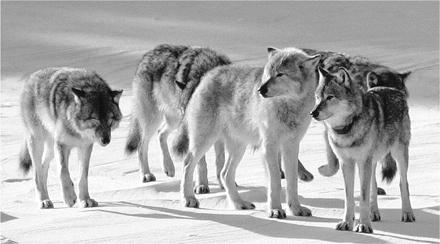(单词翻译:单击)
听力文本
This is Scientific American — 60-Second Science. I'm Emily Schwing.
[wolf sound]
Wolves are vital players in various ecosystems. So we humans need to develop a better tolerance for them. And the wolves need more space. That's according to a new study in the journal Nature Communications.
"The key implication here is it sort of begins to reframe the entire discussion of conservation, because historically, our model has been almost a postage stamp model, where we protect certain areas and try to maintain intact assemblages of animals."
University of Washington ecologist Aaron Wirsing, who took part in the study. He says the findings could lead to changes in how wildlife and land managers create policy.
"We need to allow predators to occupy more landscapes than just remote, protected areas, on the other hand, we also need to heavily manage them, recognizing that they do conflict with people."

That's why Wirsing is not calling for wolves to simply roam free, throughout North America, Europe or Australia—all places the researchers examined that have dealt with conflicts among people, their livestock and wolves. But wildlife management plans should take into account that wolves, although they do sometimes kill ranch animals, can also prevent such deaths—by driving away other predators.
"Worldwide, smaller mesopredators like coyotes, jackals and such, actually themselves prey pretty heavily on livestock and can cause a lot of economic damage."
So wolves could become a net positive in the relationship with people. If they're given a chance.
[wolf howl]
Thanks for listening the Scientific American — 60-Second Science Science. I'm Emily Schwing.
参考译文
这里是科学美国人——60秒科学。我是埃米莉·施温。
(狼叫)
狼在各类生态系统中扮演着至关重要的角色。所以我们人类给予狼更多的宽容。而且狼群也需要更多空间。这是《自然通讯》期刊上的一项新研究所得出的结论。
“这其中的关键意义在于,我们可能要重新定义有关保护的整个讨论,因为从历史上看,我们的保护模式基本上是一种邮票模式,也就是说,我们保护特定的地区,试图维护该地区动物群体的完整性。”
这是参与了这项研究的华盛顿大学生态学家亚伦·威尔辛所说。他表示,这些发现可能会改变野生动物和土地管理者制定政策的方式。
“我们要让猎食者占领更多有景观的地区,而不仅仅是偏远、受保护的地区;另一方面,我们还要对捕食者进行严格管理,承认它们与人类有冲突。”
这就是威尔辛不主张让狼群在北美、欧洲或澳大利亚自由游荡的原因,研究人员经过调查发现,这些地方都存在狼与人类及人类牲畜的冲突。但是野生动物管理计划应该考虑到的是,虽然狼有时会猎食农场动物,但是它们也会驱赶其它捕食者,来避免农场动物的死亡。
“在世界范围内,郊狼、豺狼等较小的中型捕食者会大量捕食牲畜,造成许多经济损失。”
所以说,在与人类的关系中,狼能扮演完全正面的角色,只要给它们机会。
(狼嚎)
谢谢大家收听科学美国人——60秒科学。我是埃米莉·施温。
译文为可可英语翻译,未经授权请勿转载!
重点讲解
重点讲解:
1. take part in 参加;参与;
例句:They returned to take part in the season's opening game.
他们回来参加本赛季的开幕赛。
2. call for 要求;呼吁;
例句:The newspaper articles call for severe punishment for this crime.
报上的一些文章要求严厉惩处这一罪行。
3. deal with 处理;应付;与…打交道;
例句:Once he had found his feet he was able to deal with any problem.
他一旦变得自信了就能够处理任何问题。
4. take into account 考虑到;把…计算在内;
例句:You have to take capital appreciation of the property into account.
你必须将该处房产的资本增值考虑在内。


